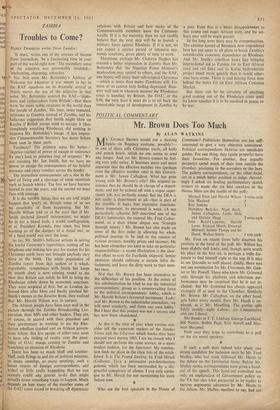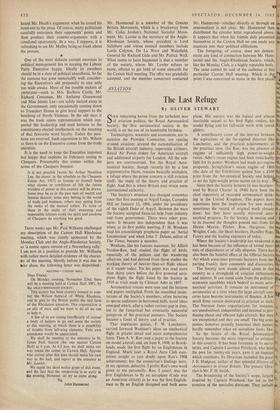POLITICAL COMMENTARY
Mr. Brown Does Too Much
By ALAN WATKINS MR. GEORGE BRoWN would cut a dashing figure—in Regency costume, possibly?— in one of those jolly Christmas cards, all holly and punch bowls, which no one seems to send any longer. And yet Mr. Brown cannot be feel- ing very jolly today. It becomes more and more apparent that the effective number two (perhaps even the effective number one) in this Govern- ment is Mr. James Callaghan. What has gone wrong with Mr. Brown's role? His original in- sistence that he should be in charge of a depart- ment, and not be palmed off with a vague super- visory job, was perfectly sound. But the DEA is not really a, department at all—that is part of the trouble. It lacks true executive functions. More important, its personnel is weak. (A not particularly sybaritic MP described one of the DEA's luminaries, the teetotal Mr. Fred Cather- wood, as a man whose slogan was 'Strength through misery.') Mr. Brown has also made an error of the first order in allowing his whole political prestige to be tied to the success of various projects, notably prices and incomes. He has been altogether too keen to take on particular responsibilities—a recent illustration is the abor- tive effort to save the Fairfields shipyard. Senior ministers should cultivate a certain lofty de- tachment, and leave the dirty work to their num- ber twos.
Not that Mr. Brown has been insensitive to the difficulties of his position. At the outset of this administration he tried to use the industrial correspondents' group as a countervailing force to the political correspondents' lobby, which is Mr. Harold Wilson's favoured instrument. 'Lads,' said Mr. Brown to the industrialist journalists, 'we will meet regularly, and form our own lobby.' But I hear that this project was not a success and has now been abandoned.
As this is the time of year when various not- ables tell the expectant readers of the Sunday • Times and the Observer which books they have enjoyed most during 1965, I see no reason why I should not perform the same service, in a more modest fashion, for the Spectator. My nomina- tion finds no place in the class lists of the estab- lished. It is The Pound Sterling, by Fred Hirsch (Gollancz, 21s.), a persuasive pro-devaluation polemic which has been surrounded by a dis- graceful conspiracy of silence. I can only apolo- gise to Mr. Hirsch for not mentioning• his work before now.
Who are the best speakers in the House of
Commons? Politicians themselves are too self- interested to give a very objective assessment. Political correspondents likewise are unreliable guides. For one thing, they (quite properly) have their favourites. For another, they (equally properly) spend much of their time outside the chamber, gossiping in the corridors or the bars. The gallery correspondents, on the other hand, are in a much better position to judge. Accord- ingly I asked six leading parliamentary sketch writers to name the six best speakers in the House. Here are the results of the poll:
Michael Foot and Harold Wilson 6 votes each
Iain Macleod 5
Roy Jenkins 3
Humphry Berkeley. Nigel Birch James Callaghan, Leslie Hale and Quintin Hogg 2 votes each John Boyd-Carpenter, Harold Lever, Richard Marsh, Emanuel Shinwell. Jeremy Thorpe and Sir
Derek. Walker-Smith 1 vote each Mr. Foot on recent form fully deserves his position at the head of the poll. Mr. Wilson has been slightly dull lately, and, though quite worth his place in the first six, is perhaps a trifle for- tunate to find himself right at the top. It is nice to see Quoodle so well placed. Oddly, there was not one nomination for Mr. Crossman, Mr. Gun- ter or Mr. Powell. Those who know Mr. Grimond only through his platform and television per- formances may be surprised that he is not in- cluded: but Mr. Grimond has always appeared strangely ill at ease in the Chamber. Similarly Mr. Brown. Mr. Callaghan. on the other hand, gets better every month.. Poor Mr. Heath is un- placed, as is Mr. Maudling. The parties split fairly evenly—eight Labour, six Conservative and one Liberal.
My thanks to T. F. Lindsay, George Lochhead, -Bill Norris, Robin Page, Eric Sewell and Nor- man Shrapnel.
Next year they hope to contribute to a poll on the six worst speakers.
*
If such a poll does indeed take place, one strong candidate for inclusion must be Mr. Fred Mulley, who last week followed Mr. Heath in the debate on the Territorial Army. Before Mr. Mulley spoke, correspondents were given a hand- out of his speech. This hand-out contained not only an explanation of Government policy on the TA but also 'what purported to be replies to various arguments advanced 'by Mr. Heath in the debate. Mr. Mulley, needless to say, had not
heard Mr. Heath's arguments when he issued his hand-out to the press. Of course, many politicians carefully anticipate their opponents' points and then produce their counter-arguments with a simulated spontaneity. In a way, I suppose, it is refreshing to see Mr. Mulley being so frank about the process.
*
One of the most delicate current exercises in political management lies in keeping the Labour Party Executive happy. Ideally its members should be in a state of political anaesthesia. So far the exercise has gone remarkably well, consider- ing the Executive's old propensity to stay only too wide awake. Most of the trouble makers of yesteryear—such as Mrs. Barbara Castle, Mr. Richard Crossman, Mr. Anthony Greenwood and Miss Jennie Lee—are safely tucked away in the Government, only occasionally coming down to Transport House to give loyal support to the bombing of North Vietnam. In the old days it was the trade union representation which sup- ported the leadership and read lectures to the constituency-elected intellectuals on the meaning of that favourite word loyalty. Today the posi- tions are reversed. Such opposition to Mr. Wilson as there is on the Executive comes from the trade unionists.
It is the need to keep the Executive impotent but happy that explains its February outing to Chequers. Presumably this comes within the terms of the Chequers bequest.
It is not possible [wrote Sir Arthur Hamilton Lee, the donor, in the schedule to the Chequers Estate Act, 1917] to foresee or foretell from what classes or conditions of life the future wielders of power in this country will be drawn. Some may be as in the past men of wealth and famous descent; some may belong to the world of trade and business; others may spring from the ranks of the manual toilers. To none of these in the midst of their strenuous and responsible labours could the spirit and anodyne of Chequers do anything but good.
Three weeks ago Mr. Paul Williams challenged my description of the Caxton Hall Rhodesian meeting, which was jointly sponsored by the Monday Club and the Anglo-Rhodesian Society, as 'a comic opera version of a Nuremberg rally.' I am now in a position to provide Mr. Williams with rather more detailed evidence of the charac- ter of the meeting. Shortly before it was due to Sake place, the following letter was dispatched : MEETING—CAXTON HALL
Dear Friend,
On Monday evening, November 22nd, there will be a meeting held at Caxton Hall, SW1, by the ANGLO-RHODESIAN SOCIETY.
This society has been recently formed to com- bat the Wilson betrayal of White Rhodesia, and to give to the British public the real facts of the Rhodesian situation. This organisation is an ally of ours, and we want to do all we can to help it.
A few of us are raising (unofficially of course) a body of helpers to go and assist the society at this meeting, at which there is a possibility of trouble from left-wing elements. Yo6r own attendance would be appreciated.
We shall be meeting at the entrance to St. James Park Station (the one nearest Caxton Hall) at 6 p.m. At 6.5 p.m. we shall make our way round the corner to Caxton Hall. Anyone who arrives after this time should make his own way to the hall, and report at the entrance to Mr. Lawler.
We regret the short notice given of this event, and the fact that the rendezvOns is so early in the evening. However, do try to come along.
Sig. John Hammond Mr. Hammond is a member of the Greater Britain Movement, which is a breakaway from Mr. Colin Jordan's National Socialist Move- ment. Mr. Lawler is the secretary of the Anglo- Rhodesian Society, whose president is Lord Salisbury and whose council members include Lords Colyton, De La Warr and Wakefield, General Sir Richard Gale and Mr. Patrick Wall. What seems to have happened is that a member of the society, whom Mr. Lawler refuses to name, offered to get hold of some stewards for the Caxton Hall meeting. The offer was gratefully accepted, and the member concerned contacted Mr. Hammond—whether directly or through an intermediary is not clear. Mr. Hammond then distributed the circular letter reproduced above. It appears that when his friends duly presented themselves at the Caxton Hall no one made any inquiries into their political affiliations.
The foregoing, of course, does not demon- strate any kind of connection between Mr. Ham- mond and the Anglo-Rhodesian Society, which, like the Monday Club, is a highly reputable body. The same cannot be said of the audience at this particular Caxton Hall meeting. Which is the point I was concerned to make in the first place.'































 Previous page
Previous page